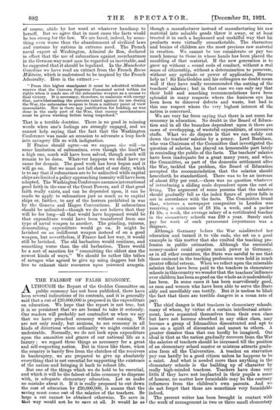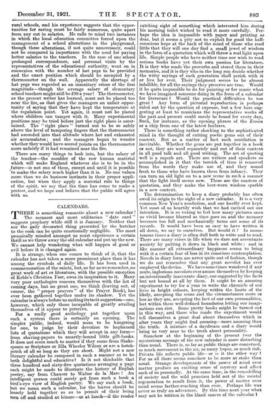THE FALSEST OF FALSE ECONOMY.
ALTHOUGH the Report of- the Geddes Committee on public economy has not been published, there have been several indications of its contents, and it is generally said that a cut of E20,000,000 is proposed in the expenditure on education. We hope that the report is not true, but it is so persistent that- we are bound to take it seriously. Our readers will probably not contradict us when we say that we have preached economy without ceasing. We are not only ready, but anxious, to see economy in all kinds of directions where ordinarily we might consider it undesirable. Normally, we do not look upon expenditure upon the amenities and graces of our national life as a luxury ; we regard these things as necessary for a great and self-respecting nation. But in times like these, when the country is barely free from the clutches of the receivers in bankruptcy-, we are prepared to give up absolutely everything that-is not essential for supporting the existence of the nation-and bringing it back to robust life. But one of the things which we do hold to be essential, and which it-will be the falsest of false economy to dispense with, is adequate elementary education. Let us make no mistake about it. If it is really proposed to cut down the cost of education by E20,000,000, it means that the saving must come out of the salaries of the teachers. So large a cut cannot' be obtained otherwise. To save in that way would not be to alive at all. It would be as' though a manufacturer instead of manufacturing his raw material into saleable goods threw it away, or at least treated it in such a haphazard and unskilful way that his products were virtually unmarketable. The characters and brains of children are the most precious raw material in creation. We cannot be too considerate or pay too much honour to those in whose hands has been placed the moulding of that material. If the new generation is to .grow up without a sound code of conduct, without a real sense of citizenship, without a determination to persevere, without any aptitude or power of application, Heaven help us ! Sir Erio Geddes and his colleagues no doubt mean well if they have really recommended the cutting of the teachers' salaries ; but in that case we can only say that their bold and searching recommendations have been splendid in many respects where the business eye has been keen to discover defects and waste, but bad in this one respect where the very highest interest of the nation is concerned.
We are very far from saying that there is not room for economy in education. No doubt in the Board of Educa- tion and in all the branches dependent upon it there are cases of overlapping, of wasteful expenditure, of excessive staffs. What we do dispute is that we can safely cut down the teachers' salaries by a penny. Lord Burnham, who was Chairman of the Committee that investigated the question of salaries, has played an honourable part lately in reminding the public of the facts. The teachers' salaries have been inadequate for a great many years, and when the Committee, as part of the domestic settlement after the War, tackled the problem, the Board of Education accepted the recommendation that the salaries- should henceforth be standardized. There- was to be an increase of about fifty per cent. —there was no question whatever of introducing a sliding scale dependent upon the cost of living. The argument of some persons that the salaries should gradually fall as the index figure of prices falls is not in accordance with the facts. The Committee found that, whereas a newspaper compositor in London was receiving a minimum of £8 10s. a week, and a packer £4 10s. a week, the average salary of a certificated teacher in the elementary schools was £99 a year. Surely such pay for work of such paramount importance was a disgrace. Although Germany before the War misdirected her education and turned it to vile ends, she set us a good example in this matter that she exalted the teaching pro- fession in public estimation. Although the successful money-maker could acquire much power in Germany, as in all other countries, the State was careful to see that those eminent in the teaching profession were held in much greater official esteem. When we reflect upon the miserable salaries that have been paid to the teachers in elementary schools in this country we wonder that the teachers' influence over children has been asgood on the whole as it undoubtedly has been. In some cases it has been marvellously good, as men and women who have been able to serve the State ably and unselfishly can testify. But it is useless to blink the fact that there are terrible dangers in a mean rate of The chief danger is that teachers in elementary schools, many of whom, by virtue of a certain intellectual attain- ment, have separated themselves from their own class but have not become absorbed in any other class, may become a group of Ishmaelites discontented and apt to pass on a spirit of discontent and unrest to others. A greater disaster than that can hardly be imagined. Our ideal is that as the nation gradually recovers from-the War the salaries of teachers should be increased, till the position of an elementary school master or mistress attracts gradu- ates from all the Universities. A teacher on starvation pay can hardly be a good citizen unless he happens to be a saint. And what is needed more than anything in the elementary schools is the building up of character by really high-minded teachers. Teachers have done very little if they have not implanted in their pupils a sense rof honour, no matter how formidable may be the contrary influences from the children's own parents. And we ;do not forget that these are sometimes very formidable indeed.
The present writer has been brought in contact with the- work of management in two or three small -elementary rural schools, -and his experience suggests that the oppor- tunities for saving must be fairly numerous, quite apart from any cut in salaries. He calls to mind two instances in which the local education committee forced upon the management of a school alterations in the playground, though these alterations, if not quite unnecessary, could not be compared in importance with the need for paying better salaries to the teachers. In the case of one school prolonged correspondence, and personal visits by the representatives of the educational authority, went on in connexion with the number of hat pegs to be provided and the exact position which should be occupied by a thermometer on the wall. Apparently the shortage of hat pegs was regarded as an insanitary crime of the first magnitude—though the average salary of elementary school teachers might still be 199 a year ! The thermometer, as the present writer has learned, must not be placed too near the fire, as that gives the managers an unfair oppor- tunity of saying that they have kept the temperature at the regulation point. Yet again, it must not be placed where children can tamper with it. Many experimental positions may be tried before just the right place is ascer- tained. The ".right place" turned out to be so safely above the level of tampering fingers that the thermometer had ascended into that altitude where hot and exhausted air accumulates ; and the managers began to wonder whether they would have scored points on the thermometer more unfairly if it had remained near the fire.
There are many things to look into, but the salary of the teacher—the moulder of the raw human material which will make England whatever she is to be in the future—is not one of them, except and until it is possible to make the salary much higher than it is. No one values more than we do business instincts in their proper appli- cation, but when they apply a material rule to things of the spirit, we say that the time has come to make a protest, and we hope and believe that the public will agree with us.



































 Previous page
Previous page